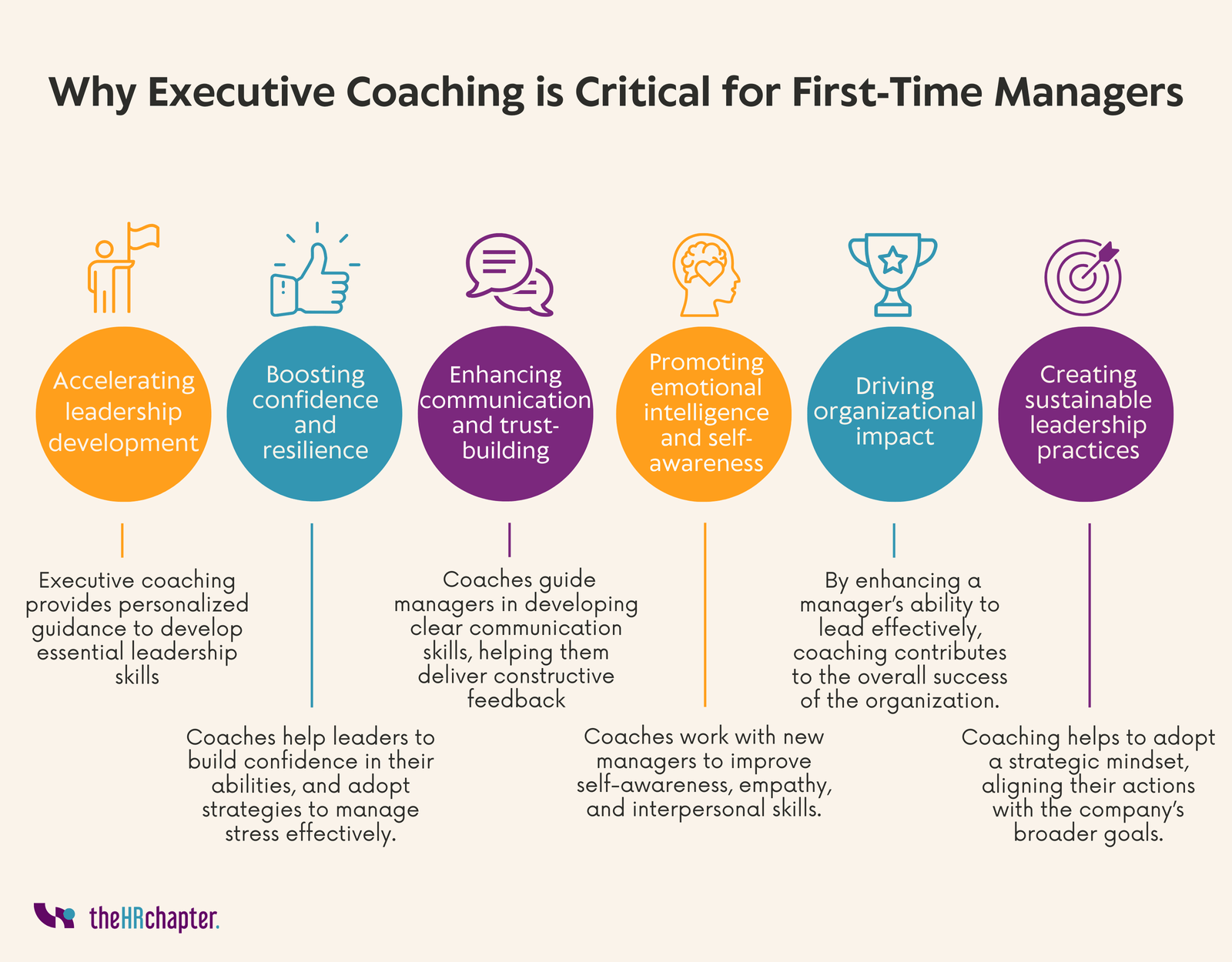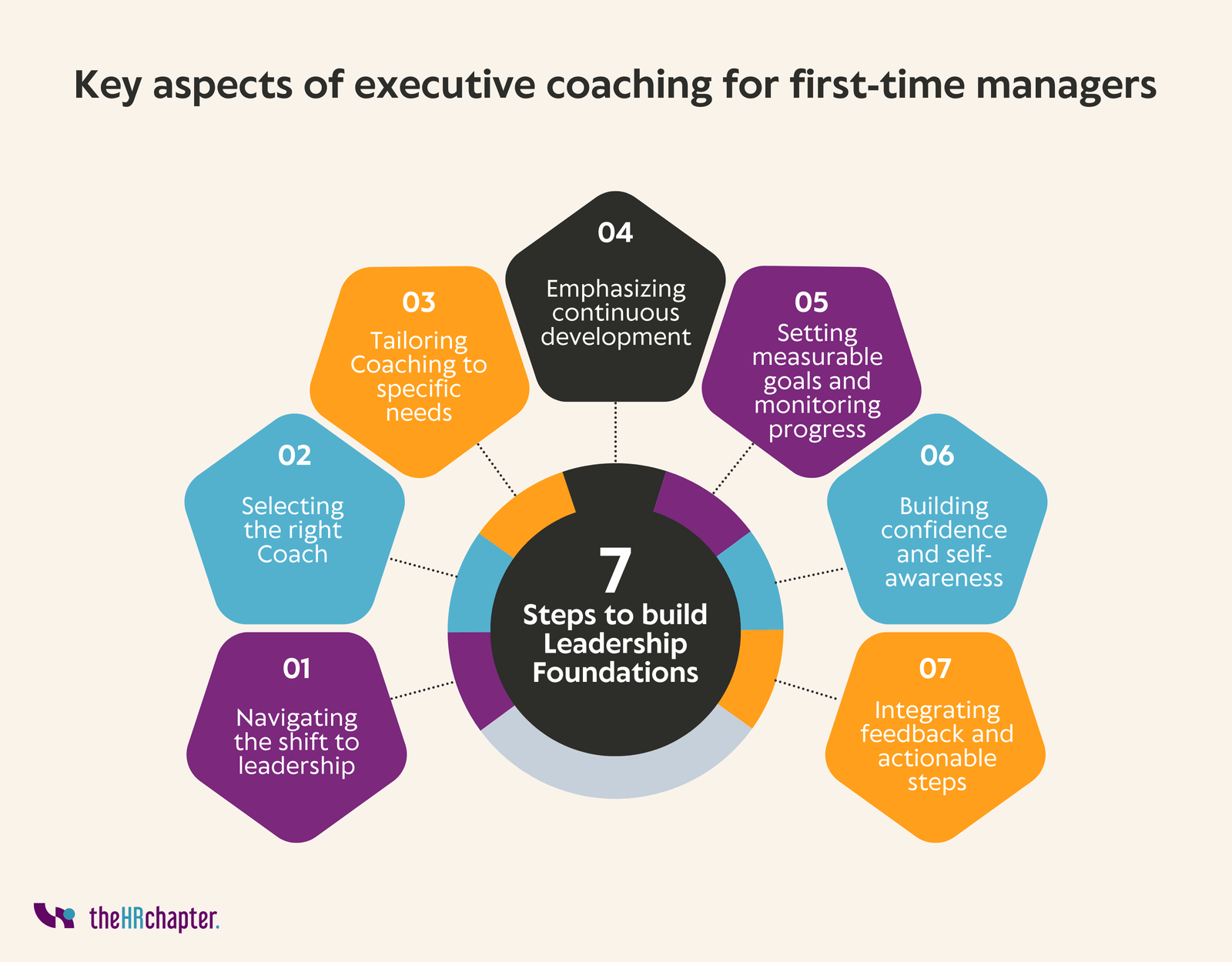Executive Coaching for First time Managers: Supporting your employees who are stepping into leadership roles

Transitioning into a leadership role for the first time is both exciting and challenging. Many first-time managers struggle with the shift from individual contributor to leader, navigating team dynamics, and managing former peers. It’s a demanding transition, and research shows that three out of five frontline managers underperform in their first two years, with significant organizational costs.
Given that managers influence up to 70% of employee engagement, their success is vital. However, without proper support, new leaders face hurdles like low confidence, disengagement, and imposter syndrome. At TheHRchapter, we believe executive coaching is a powerful tool to help first-time managers develop their leadership style, build self-awareness, and thrive in their roles.
In this article, we explore how executive coaching can empower new managers to overcome common challenges, foster team engagement, and drive success for themselves and their organizations.
Why Executive Coaching is Critical for First-Time Managers
For first-time managers, stepping into a leadership role can be as intimidating as it is exciting. This transition often involves a steep learning curve, where new responsibilities, team dynamics, and organizational expectations collide. Many new managers find themselves unprepared for the challenges ahead, such as balancing strategic thinking with day-to-day management, building trust within their teams, and making critical decisions with confidence.

Without proper support, these leaders risk stagnating in their growth or, worse, failing in their roles, which can lead to disengaged teams, high turnover rates, and organizational inefficiencies. This is where executive coaching becomes invaluable.
Executive coaching offers tailored guidance to help new managers develop the competencies and mindset required for effective leadership. It goes beyond one-size-fits-all training by addressing the specific needs of individuals, equipping them with tools to thrive both personally and professionally. Recognizing the multifaceted nature of leadership, TheHRchapter has identified six critical areas where coaching makes the most impact:
a. Accelerating leadership development
Executive coaching provides first-time managers with personalized guidance to develop essential leadership skills. From fostering empathy and active listening to mastering delegation, coaching helps new leaders shift their focus from individual achievements to empowering their teams.
b. Boosting confidence and resilience
Imposter syndrome is a common struggle for new managers, with up to 82% of people experiencing self-doubt in high-pressure roles. Coaches help leaders identify triggers of insecurity, build confidence in their abilities, and adopt strategies to manage stress effectively. This increased self-assurance enables managers to act decisively and inspire their teams.
c. Enhancing communication and trust-building
Trust is the foundation of high-performing teams. Companies with high-trust cultures outperform others in revenue generation and employee engagement. Coaches guide managers in developing clear communication skills, helping them deliver constructive feedback, admit mistakes, and foster open dialogue within their teams.
d. Promoting emotional intelligence and self-awareness
Emotional intelligence is a key factor in successful leadership. Coaches work with new managers to improve self-awareness, empathy, and interpersonal skills. This enables them to understand their team members better and build positive relationships, fostering a collaborative work environment.
e. Driving organizational impact
Executive coaching has been shown to deliver a remarkable return on investment (ROI), with studies reporting productivity gains and improved retention. By enhancing a manager’s ability to lead effectively, coaching not only benefits the individual but also contributes to the overall success of the organization.
f. Creating sustainable leadership practices
Coaching helps first-time managers adopt a strategic mindset, aligning their actions with the company’s broader goals. This focus on long-term growth ensures they develop into resourceful and resilient leaders who drive organizational success.
By addressing the unique challenges faced by first-time managers, executive coaching helps transform potential stumbling blocks into opportunities for growth. TheHRchapter recognizes the profound impact of coaching in nurturing capable, confident leaders who inspire their teams and achieve high performance.

Building Leadership Foundations: Key aspects of executive coaching for first-time managers
Executive coaching for new managers is a strategic investment that facilitates their successful transition from individual contributors to impactful leaders. By addressing the unique challenges of leadership development, it empowers managers with essential skills and confidence. Effective coaching programs leverage tailored strategies and evidence-based practices to foster growth, ensuring new managers are equipped to lead teams, drive performance, and align with organizational goals.

1. Navigating the Shift to Leadership
New managers often face significant challenges transitioning from individual contributors to team leaders, requiring them to shift their focus from personal achievements to team outcomes, navigate the emotional and relational complexities of managing former peers, and develop critical leadership skills such as motivation, conflict resolution, and coaching.
- Normalize the learning curve: Help managers understand that their struggles are common and part of the natural transition to leadership.
- Provide empathy and support: Share success stories and facilitate peer networks where they can exchange experiences, reducing feelings of isolation.
2. Selecting the Right Coach
Finding the right coach is critical. Key considerations include:
- Experience and credentials: Coaches with industry-relevant expertise and a proven track record of success.
- Cultural fit: Particularly for managers in unique environments (e.g., Bangalore-based executives), coaches who understand local business norms and cultural nuances can add significant value.
- Methodology alignment: Ensuring the coach’s approach resonates with the manager’s learning style and developmental goals.
3. Tailoring Coaching to Specific Needs
This approach ensures that managers develop leadership competencies relevant to their roles. Effective coaching programs are individualized, considering:
- Personal strengths and areas for growth: Using tools like 360-degree feedback and personality assessments to identify development opportunities.
- Role-specific challenges: Designing training around the particular demands of first-line management, such as delegation, communication, and strategic thinking.
4. Emphasizing Continuous Development
Training should go beyond one-time workshops to include ongoing learning, such as:
- Action-based learning: Embedding leadership training in real-world scenarios, where managers solve actual organizational problems under guidance.
- Coaching continuity: Regular check-ins over 6–12 months, reinforcing skills and addressing new challenges as they arise.
- Support systems: Pairing managers with mentors or creating peer-learning groups to foster shared learning and mutual encouragement.
5. Setting Measurable Goals and Monitoring Progress
Clear, measurable goals are essential to track the success of executive coaching. Effective programs:
- Set developmental benchmarks that align with organizational objectives.
- Use regular progress evaluations, including follow-up feedback, to adjust coaching strategies and maintain momentum.
6. Building Confidence and Self-Awareness
New managers often struggle with confidence in their abilities. Coaching programs should:
- Help them identify and build on their strengths.
- Provide constructive feedback to refine areas needing improvement.
- Use self-reflection exercises to develop a deeper understanding of their leadership style and its impact.
7. Integrating Feedback and Actionable Steps
Multi-source feedback provides a comprehensive view of a manager’s performance and areas for improvement.
- Coaches help interpret feedback and translate it into actionable development plans.
- Action-oriented strategies ensure that managers implement new behaviors in their daily roles, fostering tangible change.
The role of HR and senior leaders in supporting coaching programs
HR leaders and senior executives are instrumental in the success of executive coaching programs for new managers. Their first key role is identifying employees transitioning into leadership positionsand ensuring these individuals receive timely coaching support tailored to their unique challenges. Recognizing potential candidates and aligning coaching initiatives with organizational goals is essential for equipping new managers with the skills and mindset required to excel.
Resource allocation is another critical responsibility, as effective coaching requires investment in professional services, leadership development tools, and other support systems. HR and senior leaders must also monitor the program’s progress, employing metrics such as participant feedback, performance evaluations, and satisfaction surveys to assess impact and refine strategies.
Finally, fostering a coaching culture and strengthening the leadership pipeline are pivotal. By creating an environment that values learning, feedback, and development, HR and senior leaders embed leadership excellence into the organization’s DNA. Active support for coaching programs not only enhances the immediate success of new managers but also ensures the long-term growth and resilience of the leadership team.
TheHRchapter: Unlock Leadership Success with Executive Coaching
Executive coaching is a transformative tool for equipping first-time managers with the skills, confidence, and mindset essential for thriving in leadership roles. By addressing common challenges and providing personalized support, organizations can empower their new managers to lead effectively, fostering long-term success for both individuals and teams. Beyond building leadership capabilities, coaching programs contribute to a positive workplace culture that prioritizes growth and development.
Take the next step in building stronger leadership within your organization by partnering with TheHRchapter. We specialize in tailored executive coaching services designed to help your new managers excel.
Contact us today to learn how our programs can set your leadership team—and your company—on the path to success. Let’s create a culture of excellence together!
Need help with other HR services for your business?
At TheHRchapter, we provide tailored solutions to guide startups and scaleups in choosing and implementing the best tools for hiring, onboarding, payroll, employee management and more.
Core HR Services
Payroll Services: Manages payroll processing, tax filings, and employee benefits.
HR Consulting: Provides expert advice on various HR matters, including policies, procedures, and compliance
HR Services for Startups: Offers tailored solutions for startups, helping them establish a strong HR foundation.
Recruitment & Headhunting: Whether you’re looking for fresh talent or niche experts, we ensure a smooth, personalized process tailored to your specific needs.
Spread the Word!
Enjoyed what you’ve read? Help others discover it too! 📢 Share this article and let’s keep the discussion going.
Related Reads: Check out these other Articles!
Expanding to Europe? Why Hiring Is Where Scale Usually Breaks (and How to Fix It Early)
Expanding to Europe? Why Hiring Is Where Scale Usually Breaks (and How to Fix It…
Agentic AI and HR Ethics: Best practices and ensuring compliance for employees and candidates
Agentic AI and HR Ethics: Best practices and ensuring compliance for employees and candidates There’s…
2025: The Year HR Became Strategic – Key Lessons and Insights for HR Leaders
2025: The Year HR Became Strategic – Key Lessons and Insights for HR Leaders 2025…



